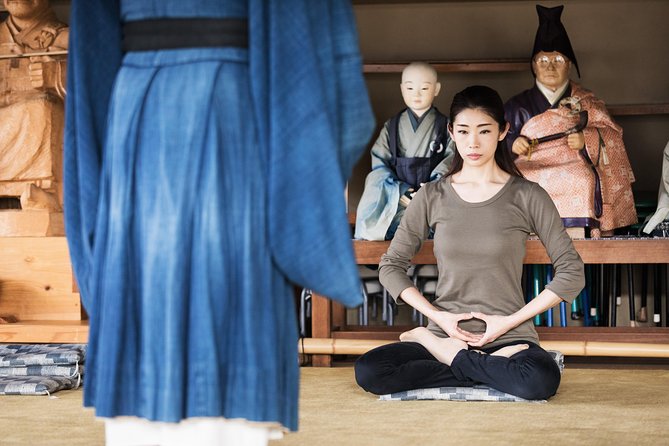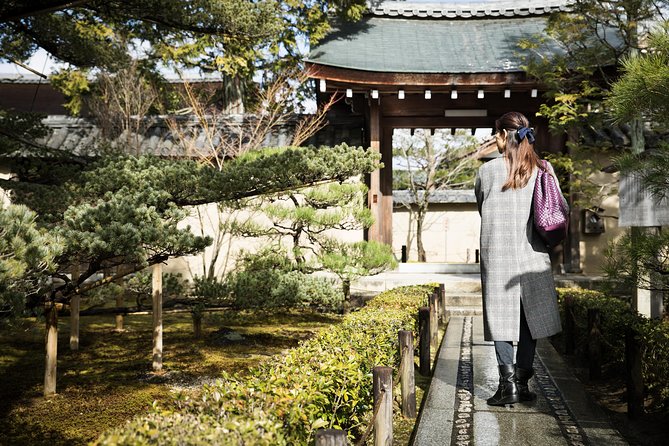Imagine sitting cross-legged in a tranquil temple hall, focusing on your breath as the aroma of simmering miso soup wafts through the air. At Daisen-in Temple, guests partake in Zazen meditation sessions followed by savoring traditional vegan meals crafted with mindfulness.
But how do these ancient Zen practices intertwine with plant-based cuisine, and what benefits do they offer? The connection runs deep, revealing a harmonious relationship between inner peace and nourishing the body.
Join the conversation to uncover the secrets behind Zen meditation and traditional vegan food, and discover how this duo can transform your well-being.
Just The Basics

- Zen and veganism share compassion and mindfulness values.
- Traditional vegan food complements Zen practice for nourishment.
- Mindful eating aligns with Zen principles for a holistic experience.
- Both Zen meditation and veganism promote simplicity, balance, and awareness.
Here's some other great tours and experiences nearby we think you'll like.
Benefits of Zen Meditation
Engaging in Zen meditation at Daisen-in Temple offers participants a chance to cultivate inner peace and mindfulness through the practice of zazen. This ancient form of meditation not only provides mental clarity and stress relief but also helps in improving focus and emotional balance.
By dedicating just 20 minutes to zazen during the hour-long session, you can experience a profound sense of calm and self-awareness. The group setting adds a communal energy that enhances the overall experience, making it a great opportunity for anyone seeking to quiet the mind and find balance in their emotions.
For those looking to unwind and center themselves, the benefits of Zen meditation at Daisen-in Temple are truly invaluable.
History of Zen Practice

Delving into the roots of Zen practice reveals a rich tapestry of ancient traditions and teachings that have influenced generations of practitioners. Zen, originating in China as Chan Buddhism, found its way to Japan where it evolved into the Zen we know today.
The essence of Zen philosophy lies in the pursuit of enlightenment through meditation, simplicity, and mindfulness. Zen masters like Bodhidharma and Dogen played pivotal roles in shaping Zen practice and philosophy, emphasizing direct experience over theoretical knowledge.
The history of Zen is a testament to the transformative power of disciplined practice and the profound impact it has had on individuals seeking spiritual growth. Understanding Zen origins offers a glimpse into the profound wisdom and time-honored traditions that continue to inspire practitioners worldwide.
Connection Between Zen and Veganism

The inherent harmony between Zen philosophy and veganism underscores a shared commitment to compassion and mindfulness in daily practices. When exploring the connection between Zen and veganism, it becomes evident that both philosophies emphasize the importance of living in harmony with all beings and the environment. This shared ethos is reflected in various ways:
- Zen and compassion go hand in hand, promoting empathy and kindness towards all living creatures.
- Vegan ethics and mindfulness intersect, encouraging individuals to be aware of the impact of their choices on the world around them.
- Both Zen and veganism advocate for simplicity and purity, guiding practitioners to lead a life of balance and awareness.
Traditional Vegan Dishes to Try
For those eager to explore the realm of vegan cuisine intertwined with Zen principles, a delightful array of traditional plant-based dishes awaits your palate. Vegan cooking in the context of Zen monasteries emphasizes simplicity, natural flavors, and mindful preparation.
These dishes not only nourish the body but also support meditation practices by promoting a sense of lightness and clarity. From hearty soups packed with seasonal vegetables to fragrant rice dishes seasoned with aromatic herbs, each bite offers a taste of mindfulness and compassion.
Mindful Eating Practices
Set out on a journey of mindful eating by savoring traditional vegan dishes intertwined with Zen principles, offering a taste of mindfulness and compassion with every bite.
Mindful cooking practices enhance the dining experience, bringing a deeper connection to the food and those who prepared it. This mindful approach not only benefits the body but also the mind, fostering a sense of gratitude and awareness during meals.
Consider these practices to enrich your dining experience:
- Engage all your senses while eating, appreciating the textures, flavors, and aromas of each dish.
- Chew slowly and savor each bite, allowing the flavors to fully unfold on your palate.
- Express gratitude for the ingredients, farmers, and cooks who contributed to your meal.
Recommended Meditation Techniques
Explore various meditation techniques that can enhance your mindfulness practice and promote inner peace in your daily life. Incorporating Zen philosophy into your meditation routine can significantly improve your mental well-being.
One effective technique is Zazen, a seated meditation where you focus on your breath and posture to cultivate awareness. Another method is walking meditation, where you move slowly and mindfully, paying attention to each step and breath.
Body scan meditation involves systematically focusing on each part of your body, releasing tension and promoting relaxation. Loving-kindness meditation is a practice of sending positive thoughts and well-wishes to yourself and others.
Balancing Zen and Vegan Lifestyle
Wondering how to strike a harmonious balance between Zen principles and a vegan lifestyle in your daily routine? It’s all about finding that sweet spot where mindfulness practices and vegan recipes come together seamlessly. Here are a few tips to help you achieve this balance:
- Start your day with a mindful meditation session to set a peaceful tone.
- Explore creative vegan recipes that not only nourish your body but also align with your Zen values.
- Incorporate mindful eating practices into your meals to fully appreciate the flavors and textures of your food.
Incorporating Zen Into Daily Meals
To infuse Zen into your daily meals, focus on simplicity and mindfulness while preparing and enjoying your food. Embrace cooking rituals that promote a sense of calm and presence in the kitchen.
Approach meal preparation as a meditative practice, paying attention to each ingredient and the actions you take. Choose fresh, whole foods that nourish your body and mind, aligning with the concept of mindful nourishment.
Engage all your senses while cooking and savor the aromas, textures, and flavors of the ingredients. Create a peaceful atmosphere in your dining space, free from distractions, to fully appreciate the meal in front of you.
Frequently Asked Questions
Are There Any Age Restrictions for Participating in the Zen Meditation and Traditional Vegan Food Experience?
There are no age restrictions for participation in the experience. The participation requirements are generally flexible, ensuring most travelers can join. It’s a group activity, so individuals under specific conditions may need to be accompanied.
Is There a Dress Code for the Meditation Session at Daisen-In Temple?
For the meditation session at Daisen-in Temple, comfortable and modest clothing is recommended as meditation attire. It’s essential to adhere to temple etiquette by wearing pants suitable for zazen practice. Enjoy the serene experience!
Will There Be English-Speaking Guides Available During the Tour?
English-speaking guides are available during the tour for language support and culture. They provide communication assistance for a local experience. Guests can enjoy insights and explanations in English throughout the experience.
Can Participants With Dietary Restrictions Be Accommodated for the Traditional Vegan Food Tasting?
Yes, participants with dietary restrictions can typically be accommodated for the traditional vegan food tasting experience. It’s best to inform the organizers in advance to ensure a smooth and enjoyable culinary adventure.
Is Photography Allowed During the Meditation Session at the Temple?
Photography etiquette during the meditation session at the temple emphasizes mindfulness. Participants should refrain from taking photos to maintain the peaceful atmosphere. Focusing on the present moment enhances the meditation experience without distractions from camera clicks.
Final Words
To sum it up, enjoying Zen meditation and traditional vegan food at Daisen-in Temple offers a unique and enriching experience for those seeking inner peace and mindfulness.
From the benefits of meditation to the connection between Zen and veganism, this tour provides insights into a holistic approach to well-being.
So don your comfy pants, prepare to relax, and embark on a journey of self-discovery through Zen practices and delicious vegan cuisine.
